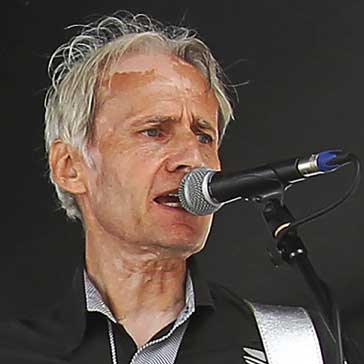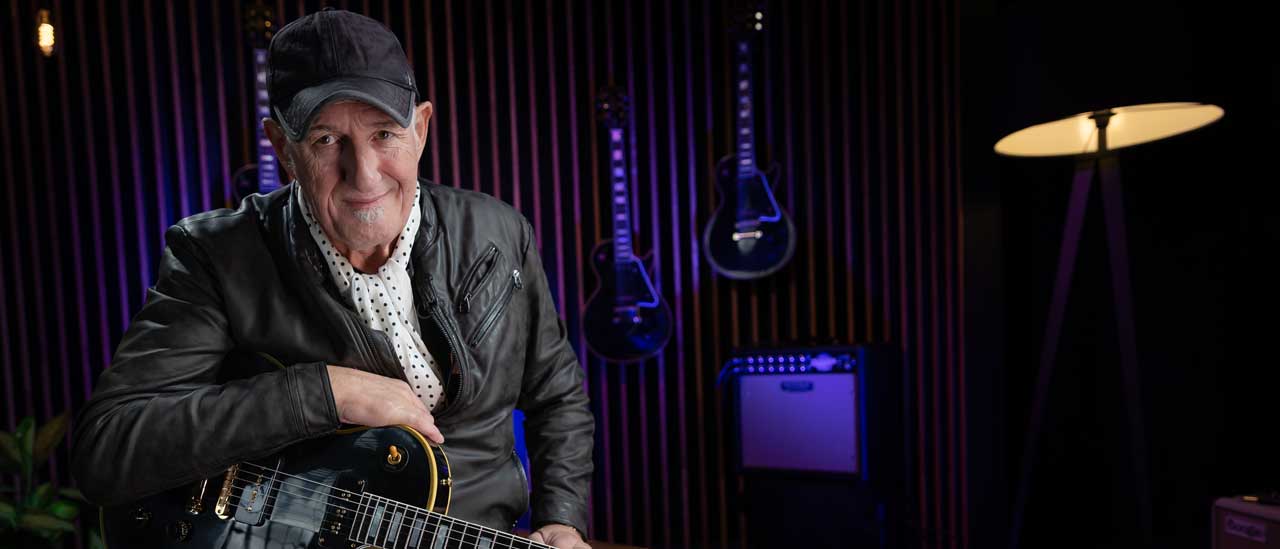"When you're cold-calling musicians, some of whom you don’t even know, it doesn't matter who you are. It's a hard gig": How Slash organised Orgy Of The Damned
With his recent album Orgy Of The Damned – a selection of classics, each sung by a different guest singer – Slash is the latest rock superstar to take the blues road
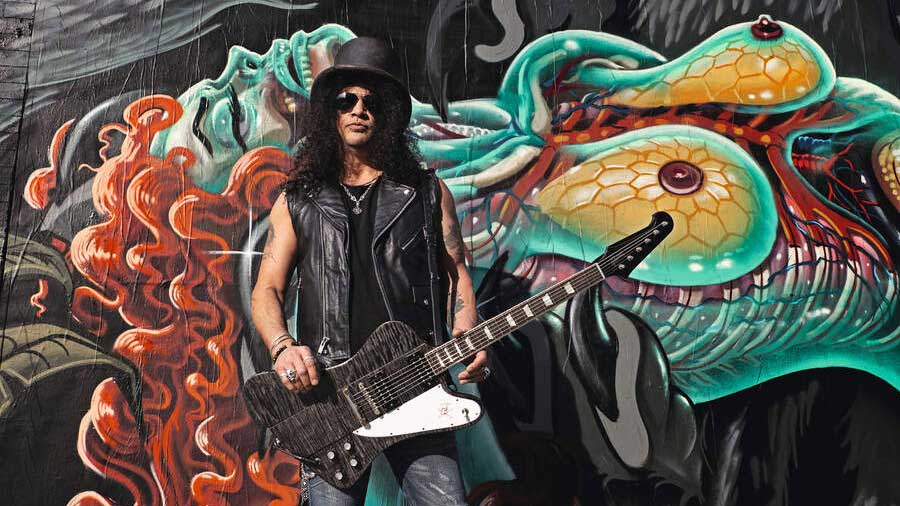
Slash is holed up in Birmingham, preparing for the second night of his UK tour with Myles Kennedy & The Conspirators. But, to paraphrase Billy F Gibbons, his head’s in Mississippi as he talks with urgent passion about his new album of mostly blues songs, featuring a host of star singers and players including Gibbons, Brian Johnson, Iggy Pop, Chris Robinson, Beth Hart, Chris Stapleton, Steven Tyler and Gary Clark Jr, among others. It’s called Orgy Of The Damned, which sounds like quite the party.
“It’s roughly a blues covers record,” Slash says. “And I thought with all this collaboration with all these different people, and blues historically being considered the devil’s music and taboo - you know, hide your kids from the fucking blues stuff - that Orgy Of The Damned seemed like a fitting title. I didn’t really think about it. It just sort of popped up.”
With the album title decided, some appropriately garish, Slash-style cover artwork commissioned, boom! - a collection of songs written and first performed by blues legends including Robert Johnson, Howlin’ Wolf and Muddy Waters is once again back in circulation on the top table of rock. So what were those guys doing 60, 70 and even 80 years ago that was so special?
“It depends on who you speak to, because everybody has got a different idea as to what it means to them,” Slash says. “For me it’s totally about the feel of it, the cadence of it, the attitude of it, the spirit of it, and of course the rhythm to it.”
Blues remains the genre that sits at magnetic north on the classic rock compass. But by rejuvenating such well-worn songs as Hoochie Coochie Man, Crossroads, Killing Floor, Born Under A Bad Sign and Stormy Monday, along with rock and R&B standards including Oh Well, The Pusher and Papa Was A Rolling Stone, Slash is putting his neck on the line twice over; not only is he boldly appropriating the work of the original blues masters, but he is also inviting comparisons with the greatest rock bands of the 1960s including Cream, Fleetwood Mac, John Mayall’s Bluesbreakers and all the rest.
“You know, if I were to think about it in those terms, then I would pack it up and go home,” Slash says, solemnly. “A lot of people have been asking me a lot of really deep questions and, man, it just wasn’t about any of that. It was really just, y’know, I like this song, this is the way that I would play it, and we jammed it, this is the arrangement we came up with and so-and-so sang it, and there you go.
"There’s a lot of really serious blues purists out there. Really studied and well-learned, well-researched blues guys out there, and they’re great players and they stick to a certain blues guideline, and they know all the notes and everything’s perfect.
Sign up below to get the latest from Classic Rock, plus exclusive special offers, direct to your inbox!
"This isn’t that. This is just me having a good time. It’s not even all traditional blues in the first place. It’s a mix of different things. But it was just kind of a fun thing that I don’t want anybody to over-analyse or try and pick it apart, because it just wasn’t put together with that many pieces to begin with.”
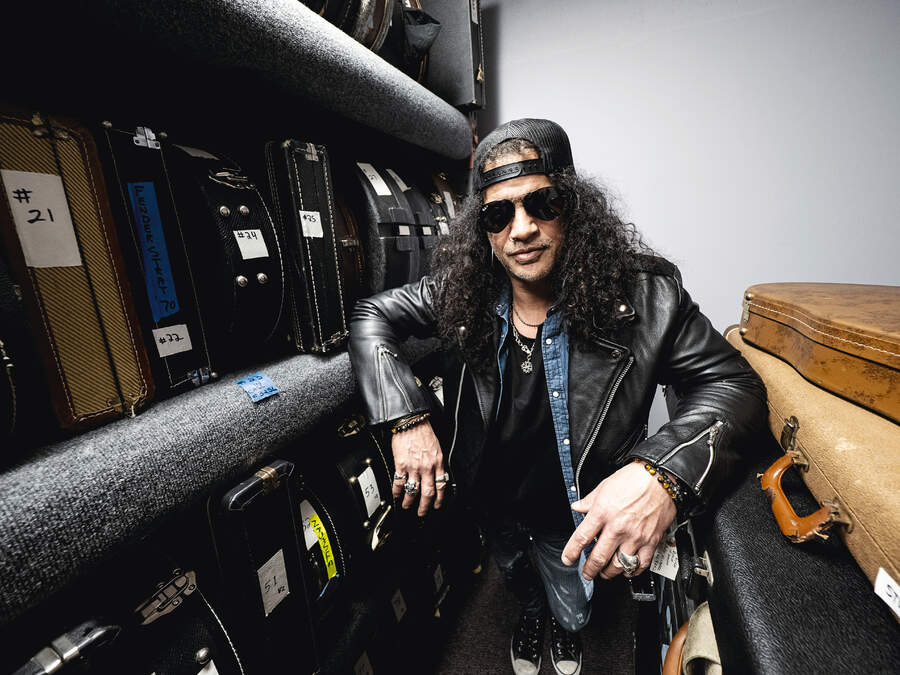
Orgy Of The Damned might well be the spontaneous, off-the-cuff project that Slash insists it is. But in another sense it’s an album that has been 30 years in the making – at least. Slash was first exposed to the British blues bands of the 60s when he was a child in England, and then when he moved to Los Angeles his grandmother turned him on to BB King.
“When I first picked up the guitar, the guys that I was inspired by were all heavily inspired by Muddy Waters and Howlin’ Wolf and Robert Johnson, BB King and Albert King. So that is really the root of where my guitar playing came from. At the same time, I was totally into brash hard rock stuff. But the bands that I was really influenced by in that realm were AC/DC, Aerosmith and bands in that sort of area of hard rock. Not so much metal, but more of a blues-based kind of a thing anyway. So it’s always been about roughly the same kind of feel. Just different dynamics of how it’s delivered.”
In 1996, after Slash had left Guns N’ Roses and between iterations of his Snakepit, he put together a side-hustle band called Slash’s Blues Ball with bassist Johnny Griparic and singer/ keyboard player Teddy Andreadis.
“It was just us getting together and we would just play in all these LA dives,” Slash recalls. “There was a lot of drinking going on, but we were having a real good time, playing all these covers and jamming around. And we actually took it to the point of touring round the US and we even did some touring in Europe. Anyway, I always wanted to make a record of that. But then there was Snakepit, then I was in hospital, then Velvet Revolver, then the Conspirators, then back to Guns N’ Roses… It’s just been very busy. Anyway, thirty years later I finally had two weeks off, and I thought I’m going to do this record now.”

The first thing Slash did was to get back together with Griparic and Andreadis, along with new collaborators Tash Neal (vocals/guitar) and Michael Jerome (drums), and start rehearsing a list of songs, some of which they used to play back in the 90s.
“These guys are great players who play in real blues bands for a living,” Slash says. “But I thought I don’t wanna put myself up against all the other fucking blues guys out there, where it’s just me trying to do a blues record, because I’m gonna lose. That’s when I got the idea of having different singers come in and make this a little bit more eclectic. Then finally I sort of broke the news to the band. ‘I’m gonna have Gary Clark come in and do a song. And I’m gonna have Demi Lovato sing this, and Paul Rodgers sing this…’ That’s how it all came together.”
Working with Appetite For Destruction producer Mike Clink, the band recorded all the music and one or two of the vocals at East West Studios and Slash’s own Snakepit studio in Los Angeles, over the two weeks that Slash had off from his Guns N’ Roses commitments in the spring of 2023. Later he went out and rounded up the other guest singers. And while you might think it would be straightforward for a star of Slash’s status and magnitude to get hold of a gang of his A-list chums, he insists that is not the case.
“Listen, when you’re cold-calling musicians, some of whom you don’t even know, it doesn’t matter who you are. It’s a hard gig. You’re trying to sell an idea. The two hardest ones to nail down were Chris Stapleton and Billy Gibbons. Billy’s all over the place. He’s always working and he’s always doing something. I told him I was doing a version of Hoochie Coochie Man, and I knew from his tone of voice that he was sceptical. I mean, he knows me, but... Anyway I had to coax him into it.
"Then finally I gave him a demo, and he says: ‘I’m gonna be in Palm Springs. We got a studio over there.’ So I wasn’t there when he did it. He just rolled into town during whatever road trip he was on, went into the studio and put the vocals and the guitars down. And that vocal is one of the best vocals of that song that you’re ever gonna hear.
“I feel really honoured that he’s on the record. And the guitar lick that he put on there… I mean, literally, I got it back, I had to sit down with my guitar and learn it, cos it’s so fucking awesome. He’s one of these guys that effortlessly puts down an amazing selection of notes in a melodic perfection. It just comes off the top of his head.”
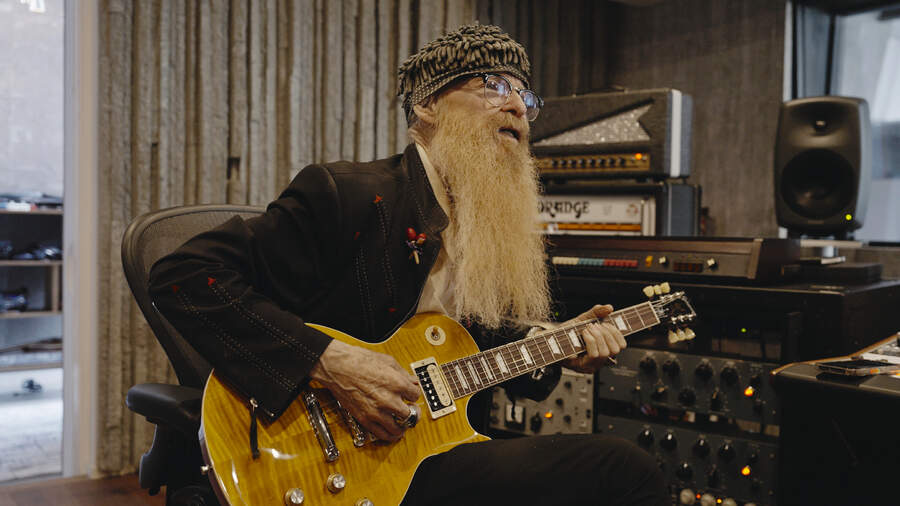
The one singer who didn’t return Slash’s calls was Steven Tyler.
“He was incommunicado for a month. And then, when the record was done, I finally heard from him: ‘Oh man, I’ve been here and there. What’s happening?’ And that’s why he came down to put the harmonica on Killing Floor.”
Killing Floor is the first single and one of the standout performances on the album by everyone in the band; a super-energised rhythm section groove overlaid with an extraordinary vocal by Brian Johnson, sounding like you’ve never heard him before. Who knew he could sing that low?
“He was the first guy that I thought of for that song,” Slash says. “I had the music, and I flew over to Florida and we started doing the session, and I could tell that he wanted to do the original version a certain kind of justice by singing it in the register that Howlin’ Wolf did it. But there was a couple of moments where he sung it in his usual high register, and it sounded very much like AC/DC covering Howlin’ Wolf. And I don’t think either of us really wanted to do that.”
The album opens with a muscular version of The Pusher, a song made famous by Steppenwolf, whose version became a counter-culture classic after it was included on the soundtrack of the 1969 film Easy Rider. The vocal and harmonica solo are by Chris Robinson of The Black Crowes.
“Chris and I have known each other since 1989, I think. Not super-close. I guess you could call us acquaintances over the years. We’d never worked together before. So he came in to my studio in LA and he just blew my mind. He did two amazingly perfect fucking takes, with harmonica live, on the same mic, y’know. Two different versions of it - two different approaches to it – and they were both amazing. I was really floored. And I love Chris to death for that. I was so impressed with it.”
Paul Rodgers and Slash go back to the days when Rodgers invited Slash to play on his own blues covers album, Muddy Water Blues: A Tribute To Muddy Waters, released in 1993. Slash was the new kid on the block at that time, and Rodgers was one of his heroes.
“With Paul, I was fortunate enough for some reason he seemed to take to me back in the day. He’s somebody that I have revered so much as a singer all my life, and for him to sort of take me in like that was really cool. I jammed with him with Queen once, live in LA with Brian May and all that, so I’ve known him for a long time. He was the first person that I thought of when I was doing Born Under A Bad Sign, and he did pretty much what I would call a sublime version. It’s so cool, and it’s so like why he is one of the best blues rock’n’roll singers from the late 1960s on.”
Beth Hart delivers a huge emotional payload on her version of Stormy Monday, the track that boasts perhaps the best blues guitar playing by Slash on the entire album. It is not the result you might have expected, given the conditions under which it was recorded. Slash and the band had rehearsed the song in a major key. Hart suggested doing it in a minor key. The band were in the studio working up the new version when Hart showed up.
“We were just rehearsing it, and she jumped in and sang it,” Slash recalls. “She’s just belting it out. She put her heart and soul into it. She’d just come back from Jeff Beck’s memorial – and Beth is a highly emotional individual anyway – so she was really fucking distraught, and you can really hear it in the delivery. And when she was done, she was gone. That was it. There were no other takes to be had. And that’s the version that is on the record. My playing is like: ‘Oh I could have played this better, I could have played that better,’ but it is what it is, y’know?”
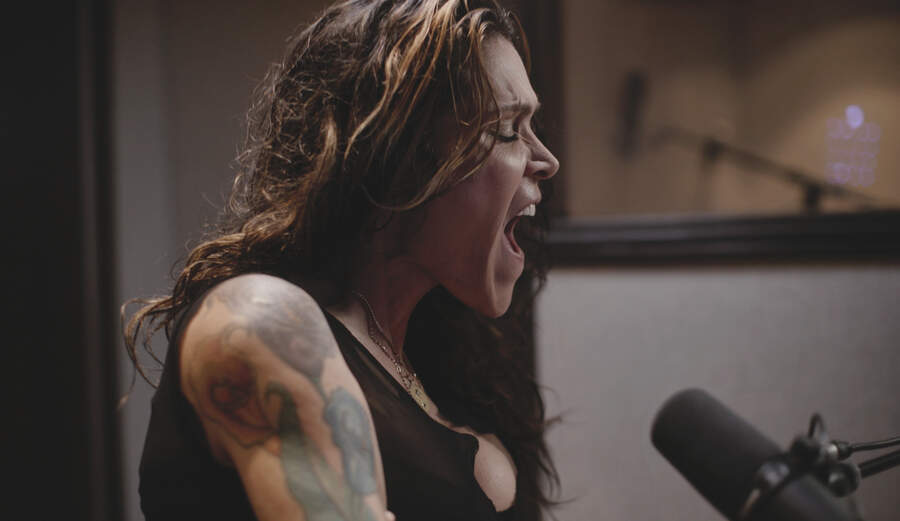
At the end of the track you can hear a clearly overwrought Hart proclaiming to no one in particular: “God, that was fuck-ing-bad-ass shit!”
“Yeah,” Slash ponders. “We left that on there because it gives you some insight into how unbelievably physical her performance was and how much blood and sweat went into that take.”
Perhaps the most counter-intuitive guest on the album – and singing the most obscure song - is Iggy Pop. How did the Godfather of Punk get to make his debut as a blues singer?
“Johnny [Griparic, bass player] read somewhere that Iggy had always wanted to do a blues thing and had just never had the chance to do it. I’d obviously worked with Iggy a lot over the years. So I called him up and I said: ‘Is there a song that you would particularly like to do?’ And without even missing a beat he said Awful Dream by Lightnin’ Hopkins. So I listened to the original, and it almost sounds like an out-take. Nobody’s playing the same thing at the same time, but it’s just got this really greasy, cool vibe. The lyrics are great. I never actually learned it. It was almost impossible to learn off that version.
“Iggy came down to my studio in LA and we just sat on a couple of stools and played it live and he just belted it out. We get towards the end of the song, and I’m hearing this sound. And I’m thinking: ‘What the fuck is that?’ And it’s Iggy mimicking a harmonica. And it was just such a cool moment. I could tell that it meant a lot to Iggy to sing that song. Not to do it for me or anything else, but to do it for himself. So I thought it was a really cool capture of a moment in time.”
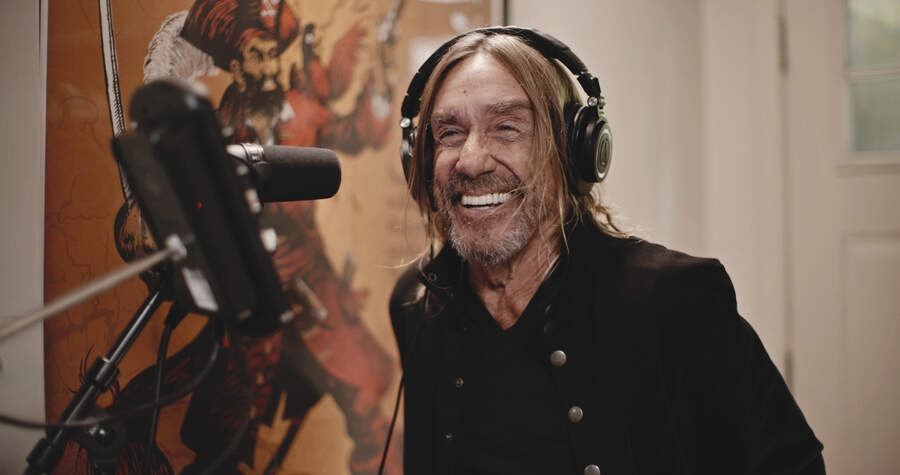
As a guitar hero who doesn’t sing, Slash is a member of a respectable club that includes Jeff Beck, Jimmy Page, Eddie Van Halen and Ritchie Blackmore among its more celebrated members. But has he ever wanted or tried to be a singer himself?
“There was a moment in time when I couldn’t find singers, that I spent probably a good six months or eight months as the singer of a three-piece. And I did it. But it’s not my thing. I don’t have the personality for it. I just don’t have that kind of outspoken, kind of… where I want to emote verbally to people. It’s just not in me.”
Do you think singers have a different mind-set from guitarists?
“It’s a good question. In my experience, all the singers that I know are way more... The way to communicate your feelings and all that in a song, and to be able to have eye contact and to be able to perform and to be able to do that is something unworldly to me.
"I can’t conceive of going out and doing that. So there’s something in a singer’s personality and their make-up that makes it possible for them to be able to express themselves in that way. Guitar players by and large hide behind their guitar. I know I do. So yeah, they’re very different animals.”
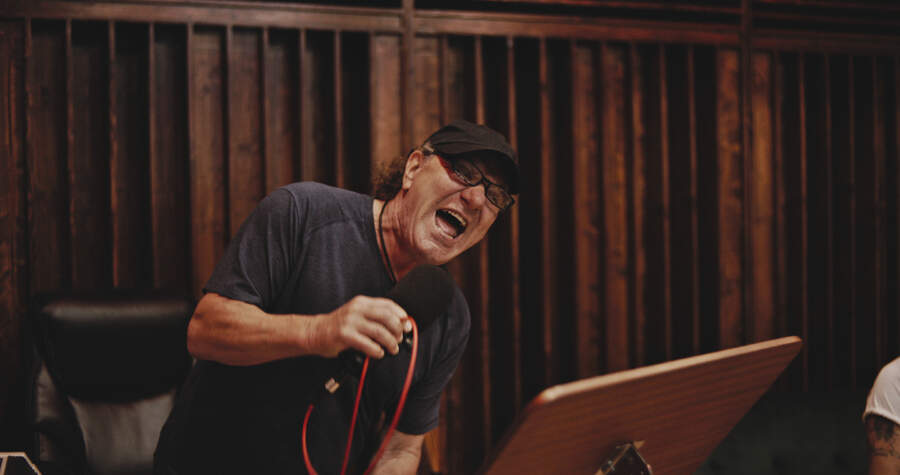
What Slash really likes doing is hanging with musicians and playing shows. And to promote Orgy Of The Damned he has announced a US Blues Festival tour beginning in July. Each date will be a multi-act, one-day festival, with performers hand-picked by Slash and his management, including the Warren Haynes Band, Keb’ ’Mo, Christone ‘Kingfish’ Ingram, Robert Randolph, Samantha Fish, Eric Gales, ZZ Ward, Jackie Venson and Larkin Poe. Slash has called it the S.E.R.P.E.N.T. Tour – an acronym that stands for Solidarity, Engagement, Restore, Peace, Equality N’ Tolerance.
“I think it’s that time where I want to do something where it’s trying to bring people together and trying to eliminate some of the differences and some of the walls and shit that’s going on between people. Cos we’re in a really fucking questionable period. A lot of people are being marginalised. And I only see it getting worse, the way things are going.
"I wanted to try and contribute in some way and help some of the people that have been unfortunate as we’ve been going down this path. Racial equality is something that I think is being, y’know, questioned here. So I wanted to do something that brought people together, because this has been… especially in the US, a really divisive period. Obviously I’m mixed race, right, so I’ve seen it from both sides.”
Accordingly, Slash has announced that a percentage of the profits from the tour will be going to several activist-group charities including the Equal Justice Initiative and the Know Your Rights Camp, among others.
Will there be anything left to pay all the bands?
“There will hopefully be enough money to pay the artists [laughs]. I have to pay them. But the rest of will be going to these different charitable groups.”
After the S.E.R.P.E.N.T. tour, plans are in hand to record a new Conspirators album. Guns N’ Roses currently have no plans to tour, although Slash says that a new GN’R record has been “on the books for a while and should start coming together”.
“This blues album was a big outlet for me to be able to do something that I love to do. I love what I do in Guns N’ Roses. I love what I do with the Conspirators and anything else that I do. I’m a hard-rock guy at heart. That’s where I come from. But this kind of blues guitar playing for me has always been the basis for everything.
"So I always find myself jamming it with people I don’t know in bars and cities where I just happen to be able to get the opportunity to sit in or whatever. So looking ahead, I’m hoping that I get to do this kind of festival thing maybe every year. And then I’ll probably want to put out another blues record - probably of originals at this point - but we’ll see what happens.”
It all seems so effortless.
“Well it’s not that it’s effortless, it’s just it’s fun, you know?”
Orgy Of The Damned is out now via Gibson Records.
Musician since the 1970s and music writer since the 1980s. Pop and rock correspondent of The Times of London (1985-2015) and columnist in Rolling Stone and Billboard magazines. Contributor to Q magazine, Kerrang!, Mojo, The Guardian, The Independent, The Telegraph, et al. Formerly drummer in TV Smith’s Explorers, London Zoo, Laughing Sam’s Dice and others. Currently singer, songwriter and guitarist with the David Sinclair Four (DS4). His sixth album as bandleader, Apropos Blues, is released 2 September 2022 on Critical Discs/Proper.

